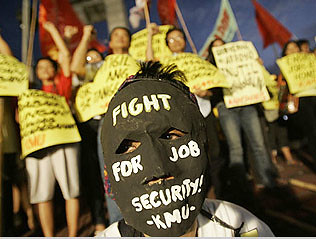
Activists protest the alleged government inaction to massive retrenchments of Filipino workers due to the economic crisis. AP
Despite fears that a quarter of a million Filipinos will lose their jobs overseas in the first quarter of 2009, government statistics show that the sheer volume of Filipinos leaving the country to work abroad more than offsets the number of those laid off. The Department of Labor and Employment (DOLE) on Thursday said that the Philippine government exceeded its deployment target by more than 300,000 new hires in 2008, an increase of almost 30 percent compared to the same period in 2007. Data from the Philippine Overseas Employment Agency (POEA) showed that 1,376,823 Filipinos left the country last year to look for greener pastures abroad. Fears that thousands of Filipino workers would be laid off when global economies slow down threaten to reduce the number of remittances sent back home in 2009. Remittances are considered the lifeblood of the Philippine economy, boosting the country’s dollar reserves and keeping it afloat. The latest Bangko Sentral ng Pilipinas (BSP) figures showed that $15 billion was remitted by overseas Filipino workers (OFWs) in January to November 2008; 15.1 percent higher than in the same period in 2007. As export-dependent countries start slowing down amid the global crisis, several companies implement a “last-in, first-out" policy targeting foreign workers. Last week, Malaysia announced that it has banned the employment of foreign workers in its manufacturing sector and ordered employers to "sacrifice" migrants first before locals should they need to trim down their work force. But Labor Secretary Marianito Roque said the potential effects of the continuing global economic slowdown on deployment could be mitigated with the strong labor demand in five host countries. Roque said Filipinos remain in high demand Canada, Bulgaria, Australia, the United Arab Emirates, and Qatar. The different Philippine Overseas Labor Offices in various countries have also begun to match the skills of displaced Filipinos with labor demands in other countries. There have been conflicting reports coming from government and non-government agencies regarding the possible number of Filipinos who will be victims of massive layoffs overseas. SM Investments Corporation vice president Cora Guidote, who had more than a decade of experience in stock brokerage and asset management, foresaw that more than a million Filipinos would lose their jobs abroad. Guidote noted that the US-led financial crisis would hit the housing sector; banking and finance; insurance; upscale retail and leisure services; airlines and shipping; and the manufacturing industry. “You can just imagine how many will be laid off, Mahina na yung 1-million (One million is few)," Guidote said in a recent forum. Meanwhile, Labor Secretary Roque was quoted in reports as saying that 250,000 OFWs would return home without jobs this year.
‘Fanning the fire’ But UP economics professor Solita Monsod said government officials and business leaders should stop spreading fears of unemployment unless they have hard proof that it is indeed taking effect. Monsod told GMANews.TV on Wednesday that unemployment, while being a poor indicator of the economic crisis, further erodes confidence in the Philippine economy. “Everyone wants the Philippines to fail. It might become a self-fulfilling prophecy," Monsod said. Despite an economic slowdown in several export-dependent countries like Taiwan, South Korea and China, the average daily deployment of Filipinos overseas remains steady at 3,647 every month, which more than offsets the number of lost jobs abroad since October, said POEA chief Jennifer Manalili in an earlier interview. Manalili said the POEA was still able to process 650,563 job orders from January to December last year. The bulk of workers, some 61,164 Filipinos, left for the Kingdom of Saudi Arabia, tagged as a recession-proof country. Other Middle East countries such as the United Arab Emirates, Qatar, Kuwait, Oman and Bahrain were able to absorb more than 66,000 Filipino workers. Other top destination countries are Taiwan, Hong Kong and Canada. Recruitment leader Victor Fernandez Jr., president of the Philippine Association of Service Exporters, Inc. (Pasei), said OFWs have a better chance of surviving if they simply look harder for jobs and not be too choosy about it. “Even though the pay is low, it’s better to have a job that is stable," said Fernandez. - GMANews.TV 




